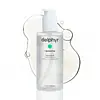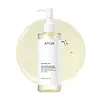What's inside
What's inside
 Key Ingredients
Key Ingredients

 Benefits
Benefits

 Concerns
Concerns

 Ingredients Side-by-side
Ingredients Side-by-side

Ethylhexyl Palmitate
EmollientSorbeth-30 Tetraoleate
EmulsifyingTriethylhexanoin
MaskingCetyl Ethylhexanoate
EmollientDiisostearyl Malate
EmollientCaprylic/Capric Triglyceride
MaskingSorbitan Sesquioleate
EmulsifyingCaprylyl Glycol
EmollientEthylhexylglycerin
Skin ConditioningWater
Skin ConditioningDipropylene Glycol
HumectantGlycerin
HumectantHydrogenated Lecithin
EmulsifyingPolyglyceryl-10 Oleate
Skin ConditioningAsiaticoside
AntioxidantMadecassic Acid
Skin ConditioningAsiatic Acid
Skin ConditioningEthylhexyl Palmitate, Sorbeth-30 Tetraoleate, Triethylhexanoin, Cetyl Ethylhexanoate, Diisostearyl Malate, Caprylic/Capric Triglyceride, Sorbitan Sesquioleate, Caprylyl Glycol, Ethylhexylglycerin, Water, Dipropylene Glycol, Glycerin, Hydrogenated Lecithin, Polyglyceryl-10 Oleate, Asiaticoside, Madecassic Acid, Asiatic Acid
Ethylhexyl Palmitate
EmollientSorbeth-30 Tetraoleate
EmulsifyingSorbitan Sesquioleate
EmulsifyingCaprylic/Capric Triglyceride
MaskingButyl Avocadate
Skin ConditioningParfum
MaskingHelianthus Annuus Seed Oil
EmollientMacadamia Ternifolia Seed Oil
EmollientOlea Europaea Fruit Oil
MaskingSimmondsia Chinensis Seed Oil
EmollientVitis Vinifera Seed Oil
EmollientCaprylyl Glycol
EmollientEthylhexylglycerin
Skin ConditioningCurcuma Longa Root Extract
MaskingMelia Azadirachta Flower Extract
Skin ConditioningTocopherol
AntioxidantMelia Azadirachta Leaf Extract
Skin ConditioningHouttuynia Cordata Extract
Skin ConditioningCorallina Officinalis Extract
Skin ConditioningMelia Azadirachta Bark Extract
AntimicrobialMoringa Oleifera Seed Oil
EmollientOcimum Sanctum Leaf Extract
Skin ConditioningEthylhexyl Palmitate, Sorbeth-30 Tetraoleate, Sorbitan Sesquioleate, Caprylic/Capric Triglyceride, Butyl Avocadate, Parfum, Helianthus Annuus Seed Oil, Macadamia Ternifolia Seed Oil, Olea Europaea Fruit Oil, Simmondsia Chinensis Seed Oil, Vitis Vinifera Seed Oil, Caprylyl Glycol, Ethylhexylglycerin, Curcuma Longa Root Extract, Melia Azadirachta Flower Extract, Tocopherol, Melia Azadirachta Leaf Extract, Houttuynia Cordata Extract, Corallina Officinalis Extract, Melia Azadirachta Bark Extract, Moringa Oleifera Seed Oil, Ocimum Sanctum Leaf Extract
 Reviews
Reviews

Ingredients Explained
These ingredients are found in both products.
Ingredients higher up in an ingredient list are typically present in a larger amount.
This ingredient is an emollient, solvent, and texture enhancer. It is considered a skin-softener by helping the skin prevent moisture loss.
It helps thicken a product's formula and makes it easier to spread by dissolving clumping compounds.
Caprylic Triglyceride is made by combining glycerin with coconut oil, forming a clear liquid.
While there is an assumption Caprylic Triglyceride can clog pores due to it being derived from coconut oil, there is no research supporting this.
Learn more about Caprylic/Capric TriglycerideCaprylyl Glycol is a humectant and emollient, meaning it attracts and preserves moisture.
It is a common ingredient in many products, especially those designed to hydrate skin. The primary benefits are retaining moisture, skin softening, and promoting a healthy skin barrier.
Though Caprylyl Glycol is an alcohol derived from fatty acids, it is not the kind that can dry out skin.
This ingredient is also used as a preservative to extend the life of products. It has slight antimicrobial properties.
Learn more about Caprylyl GlycolEthylhexyl Palmitate, also known as octyl palmitate, is created from 2-ethylhexyl alcohol and palmitic acid. It is a fatty acid ester.
The fatty acid content of Ethylhexyl Palmitate makes it an emollient. Emollients help soften and hydrate your skin by trapping moisture within.
Ethylhexyl Palmitate is also used to help improve the texture of cosmetics. It helps other ingredient dissolve in products and help disperse ingredients more evenly.
You'll likely find this ingredient in sunscreen, as it is often used to mix UV-blocking ingredients such as avobenzone and ethylhexyl triazone.
It can also help stabilize the fragrances in a product as a fragrance fixative.
Ethylhexyl Palmitate can be used to substitute mineral oil.
Due to its high fatty acid content, it may not be fungal-acne safe.
Learn more about Ethylhexyl PalmitateEthylhexylglycerin (we can't pronounce this either) is commonly used as a preservative and skin softener. It is derived from glyceryl.
You might see Ethylhexylglycerin often paired with other preservatives such as phenoxyethanol. Ethylhexylglycerin has been found to increase the effectiveness of these other preservatives.
Sorbeth-30 Tetraoleate is a surfactant and emulsifier.
This ingredient is a tetraester from oleic acid and polyethylene glycol ether of sorbitol.
As an emulsifier, it helps ingredients such as oil and water mix together. This allows the dirt and oils in your skin to be washed away.
One study found pumpkin oil containing Sorbeth-30 Tetraoleate helped hydrate the skin and did not cause any irritation.
Learn more about Sorbeth-30 TetraoleateSorbitan Sesquioleate is derived from sorbitol and oleic acid. It is an emulsifier and prevents ingredients from separating.
Specifically, this ingredient is a water-in-oil emulsifier, meaning it helps water dissolve into oil.
Some studies suggest this ingredient may cause irritation in some people. If you are unsure, it is best to patch test.
This ingredient may not be Malassezia folliculitis, or fungal-acne safe.
Learn more about Sorbitan Sesquioleate